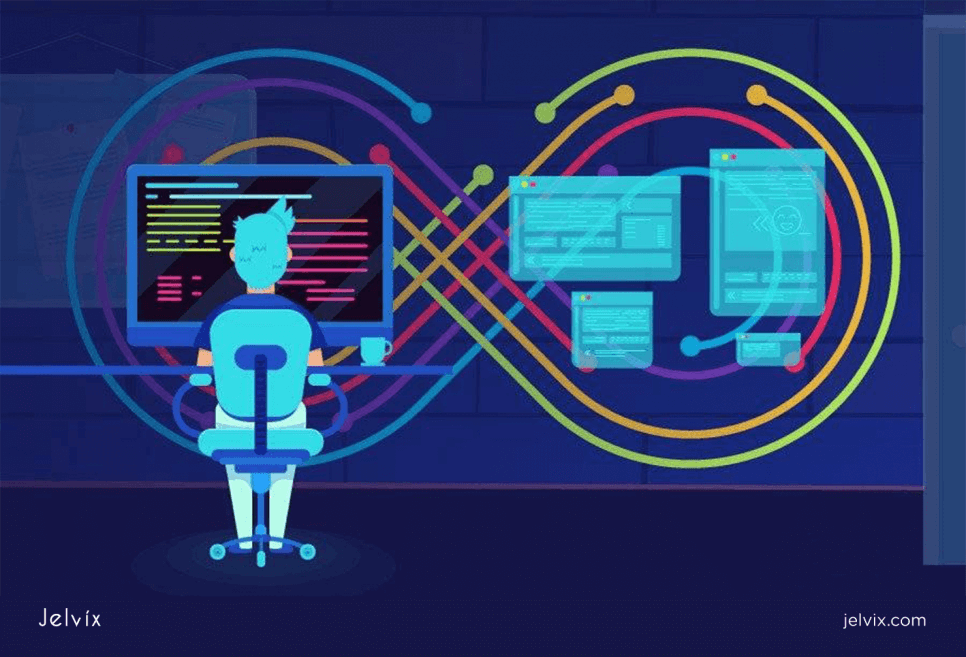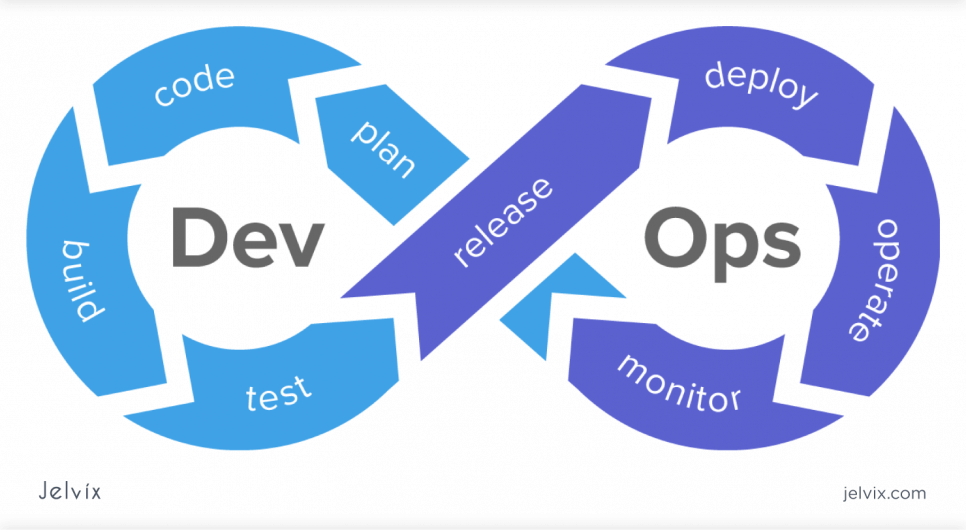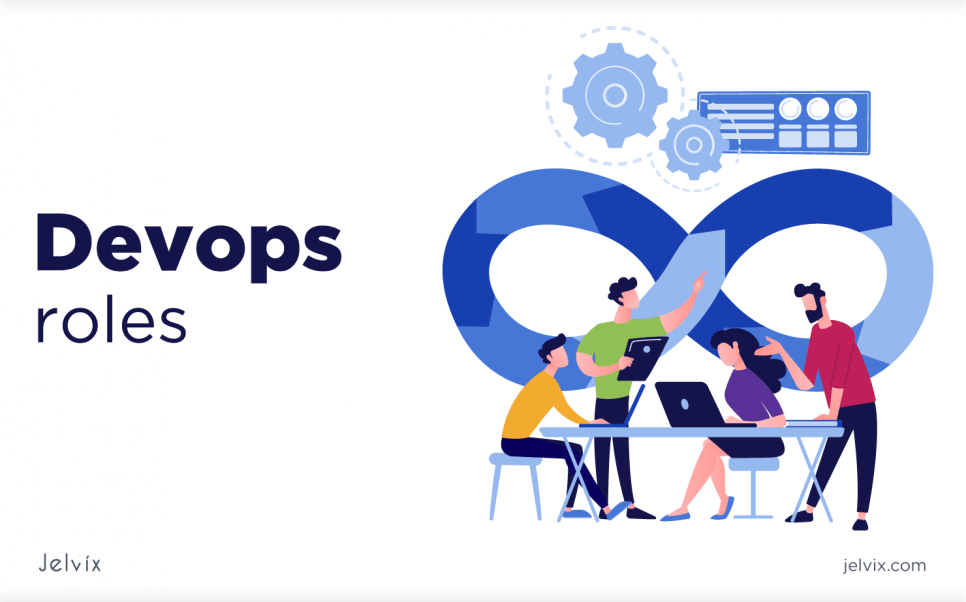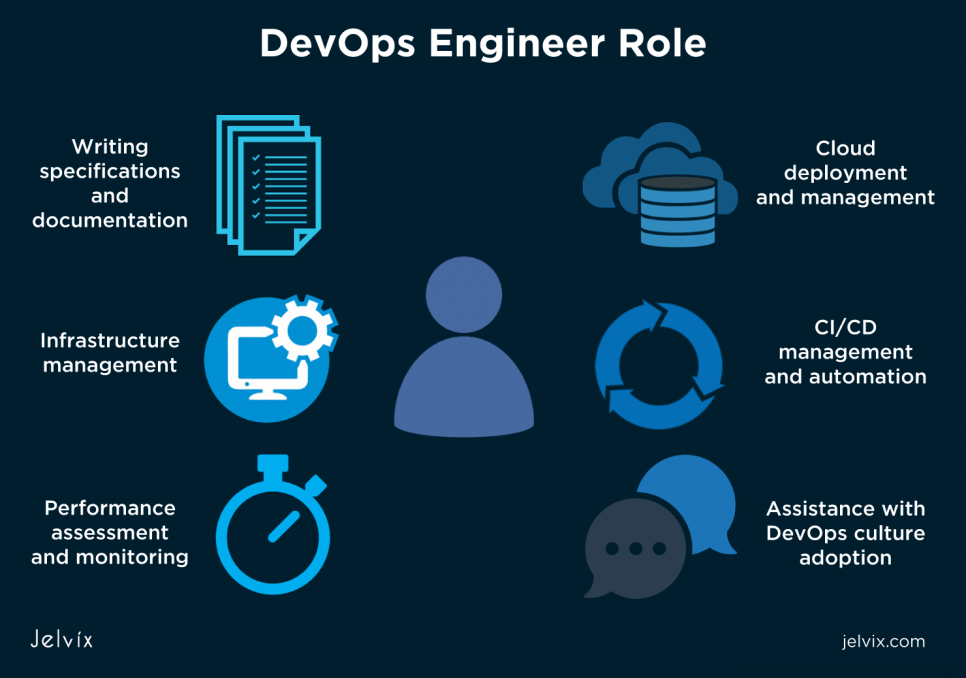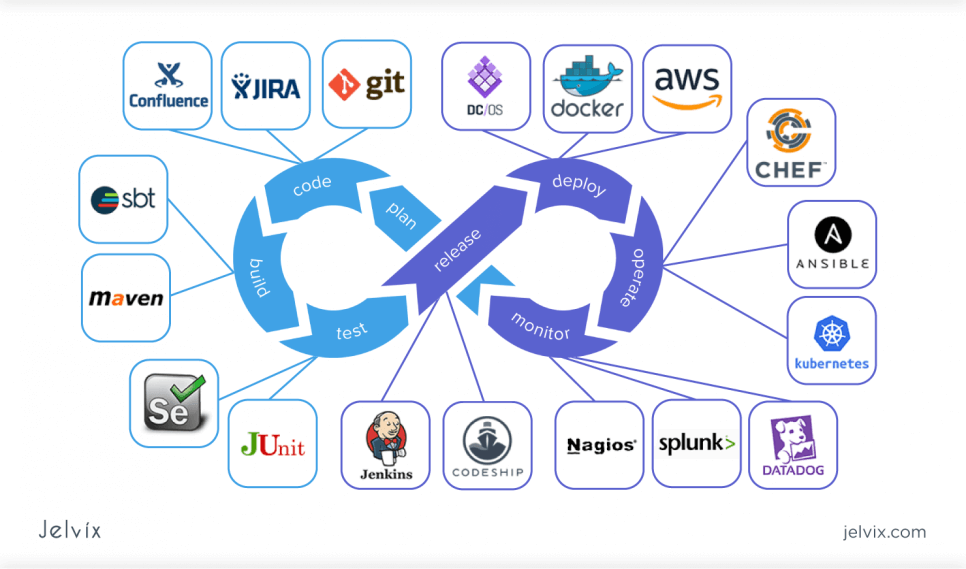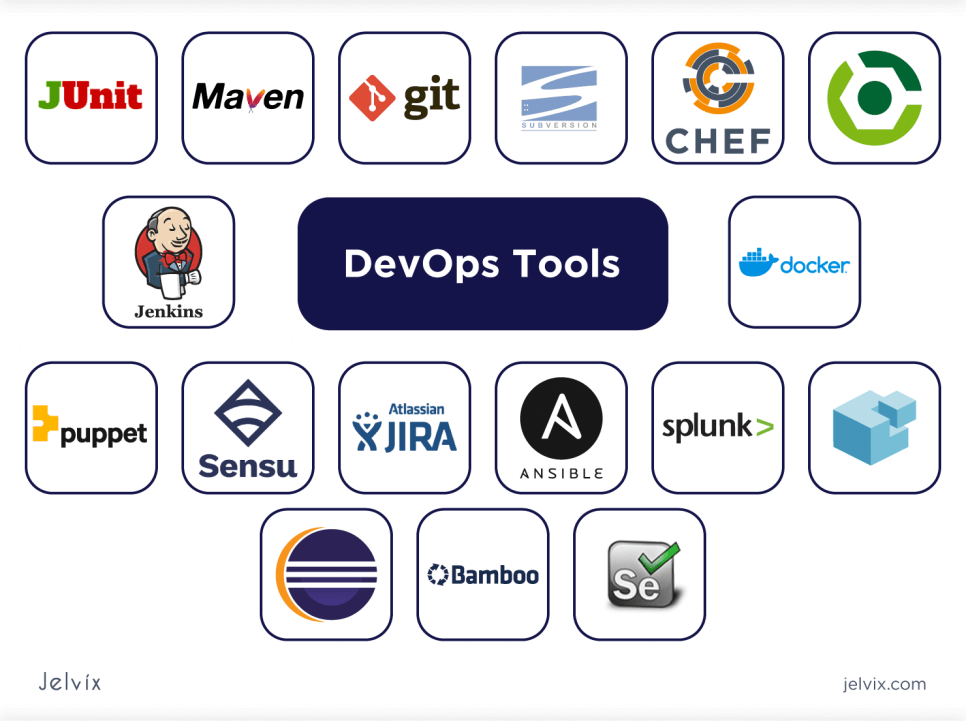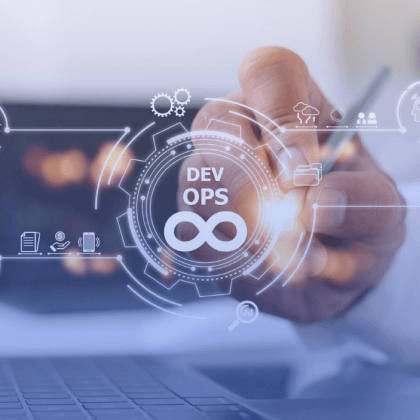As a culture and philosophy, DevOps has taken the IT world by storm. It represents a range of best practices geared towards the unification and automation of developing, testing, and release processes in the software development lifecycle.
The term “DevOps” derives from the combination of words Dev and Ops, where dev mean development and ops means operations. Simply put, the DevOps practices are aimed at bridging the gap between development and operations teams, which results in delivering applications and services at a faster pace.
It’s a no-brainer that any organization moving from the siloed structure to implementing DevOps architecture experiences substantial changes. Successful DevOps implementation is not a straightforward highway. It calls for the right tools, strategy, and, most importantly, the right people.
According to Atlassian’s 2020 DevOps Trends Survey, 85% of the companies faced challenges when adopting DevOps, and 37% of them specified that the employees’ lack of skills was one of the major barriers. These numbers only highlight the critical role of DevOps engineers for a smooth and coherent DevOps restructuring.
In this article, we will delve into the aspects of the DevOps engineer job description and cover key responsibilities, essential skills, and roles of the DevOps personnel in the company.
What is a DevOps Engineer?
A DevOps engineer is an IT specialist who has a deep understanding of the software development lifecycle and works with developers, IT operations, and quality assurance specialists to manage code releases.
DevOps engineers are tightly involved in all aspects of the development lifecycle. Therefore, they are expected to have practical knowledge of agile principles, system architecture, administration and provisioning, and different automation tools representing fundamental elements of continuous integration and continuous delivery (CI/CD) pipelines.
As a rule, the DevOps engineer path is either taken by the developers who find the deployment and network operations interesting or sysadmins who take great pleasure in coding and thus engage in the development part to improve the planning of deployment and testing.
DevOps Engineer Salary Range
Due to substantial influence on the business processes and the variety of skills required for this position, DevOps engineers enjoy one of the highest salaries in the present-day job market. Glassdoor reports that the average base pay of a DevOps engineer in the US is $103,256 per year, with $76,000 at the low end of the range and $141,000 at the high end.
As more and more companies are starting to implement DevOps philosophy into their development strategies, the demand for professionals in the area is drastically increasing along with the average salary. And even though selecting the DevOps career may take a great deal of time and energy – it is definitely worth it.
DevOps Engineer vs Software Engineer
DevOps engineers and software engineers are the two most sought-after specialists. However, employers with the little technological background may find it difficult to determine who they are looking for. So let’s figure out the difference between these professions.
As mentioned above, DevOps engineers are primarily focused on managing deployment and operation processes and overseeing code releases. They need to have in-depth knowledge of the entire software development cycle, agile principles, the latest development technologies, and tools.
On the other hand, software engineers concentrate their efforts on designing, developing, testing, maintaining, and improving the software code. Therefore, they require a thorough understanding of data structure and algorithms, programming languages, experience in troubleshooting software issues, and analytical skills.
So, the DevOps engineer deals with code releases and monitors IT operations, while the software engineer cares for “building” software and maintaining codebases.
Let's take a look at textbook definitions and key aspects of both DevOps vs Agile before drawing lines between them.
DevOps Roles Explained
The role of a DevOps specialist varies from company to company. Traditionally, it embraces such aspects as release engineering, infrastructure management, system administration, and advocacy of DevOps culture throughout the company.
Yet, suppose the organization wants to get all the benefits of implementing DevOps. In this case, it might consider hiring a team of DevOps engineers that will collaborate with other IT staff to ensure smooth deployment and operation processes. Here’s the list of possible positions in a DevOps team:
- DevOps Evangelist is the leader of the team. This person is primarily concerned with the implementation and maintenance of DevOps practices in the organization.
- Release Manager is a person responsible for releasing new features or updates and the post-release support of the product. On top of that, release managers may also define the standards used to determine if the software build is suitable for release or not.
- An automation expert is a person in charge of developing and maintaining the CI/CD pipeline. Apart from that, this specialist deals with the building and administration of containers and virtual machines.
- DevSecOps engineer is responsible for building and maintaining infrastructure security and eliminating possible threats and vulnerabilities.
- IT operations engineer takes care of the organization’s equipment, systems, and other facilities. These people ensure that the infrastructure, systems, and services are secure and reliable.
- Configuration management engineer is a person in charge of configuration, optimization, and support of infrastructure components.
What Responsibilities Does a DevOps Engineer Have?
The DevOps engineer responsibilities can be described as a perfect fusion of technical and management functions. This position often involves multitasking and demonstrating flexibility to destroy barriers between development and operation teams and ensure continuous integration and continuous delivery.
So, what do DevOps engineers do on a daily basis? Some of the key DevOps responsibilities include:
- Setting up development, testing, and automation tools and IT infrastructure;
- Choosing and deploying appropriate CI/CD tools;
- Identifying possible ways to automate and improve the architecture and processes of software development and release;
- Monitoring the processes to minimize or reduce the time and resource wastage;
- Providing maintenance and troubleshooting to ensure that the production environment works reliably;
- Reviewing, verifying, and validating the code developed for the project;
- Developing documentation and specifications for the server-side features;
- Building and improvement of continuous integration and continuous deployment pipeline;
- Determining and deploying security measures as a result of performing vulnerability and risk assessments;
- Advocating DevOps culture adoption within the organization;
- Collaboration with development and operations teams to ensure that the product development process is smooth and everything works as intended;
- Participation in planning out the project and taking important project management decisions.
What Skills Does a DevOps Engineer Need?
To build a successful career as a DevOps professional, the person normally requires technical skills to understand the development lifecycle, operations skills to maintain and support the software, and communication skills to collaborate, erase the silos in the processes and achieve the best outcomes.
Let’s walk through the essential DevOps skills that every professional in this field should acquire.
-
Experience with DevOps Tools
Using the right tools is the key factor of successful DevOps practices. DevOps specialists need to have practical knowledge of the major tools and technologies used for software development, testing, and deployment processes.
As technologies involved in these processes are constantly evolving, the professionals should also be curious about all the innovations and show a willingness to learn and continuously improve.
-
Configuration and Deployment Management
DevOps engineers are expected to have experience with configuration and deployment management tools, for example, Puppet, Chef, or GitHub. In this way, they will be able to automate system administration tasks, better deploy the constantly changing code, craft releases that work smoothly and accelerate their speed.
-
Containerization Skills
Containerization has revolutionized the IT world, allowing to bundle the application and its dependencies in the same image. As more and more companies adopt this technology, the experience with the container orchestration platforms (Docker Swarm or Kubernetes) becomes a must-have skill for DevOps engineers.
-
System Architecture and Provisioning
DevOps specialists should understand how to design, provision, and operate the realm of computer ecosystems both on-premise or in the cloud. It’s also important to have experience with modeling the system infrastructure in the cloud and management of cloud infrastructure resources.
-
Coding and Scripting Background
Aside from understanding how to use various tools, a DevOps professional should be well-versed in programming languages. It’s crucial to be familiar with multiple scripting languages, such as JavaScript, Java, Ruby, Python, PHP, etc.
The coding skills will provide the ability to build a stable and effective CI/CD pipeline and automate its stages to optimize the processes for the entire team.
-
Security Skills
DevOps personnel ensures the integrity and security of the applications or services deployed by an organization. By collaborating with cybersecurity specialists, they implement security measures to be certain that new updates or bug fixes do not create any vulnerabilities or possible threats for business data breaches.
-
Problem-Solving and Troubleshooting Skills
Identifying and quickly solving issues and bottlenecks in the processes is crucial for becoming a successful DevOps engineer. The specialist is expected to have analytical and strategic thinking that allows to suggest and implement improvements and fixes fast and ensure that everything runs smoothly and meets expectations.
-
Communication and Interpersonal Skills
Communication and collaboration across departments are the cornerstones of DevOps strategy. DevOps specialists are the glue that creates connections between teams or separate people responsible for different aspects of the development process.
Therefore, they should know how to communicate with different people, provide fast and constructive feedback and be excellent team players. In this way, they will be able to improve the performance of teams and overall development workflow.
Examples of DevOps Tools
They say, “good tools make a skilled craftsman better.” In their daily routine, DevOps engineers rely on a wide range of tools and technologies to do their tasks effectively.
If your company is planning to implement a DevOps strategy and hire a single engineer or a whole team of specialists, the tools are one of the determining factors that might influence your final decision.
Here’s the list of the most widely used platforms and technologies that help to automate the continuous deployment delivery and integration process:
-
Source Code Management
Source code management tools like Git and Jira provide the ability to monitor the changes and track the progress of any development process. In addition, the tools store the history of versions and allow reverting to the previous version of the code if the need arises.
The source code management platforms can also become very useful on the occasions when bugs appear in the new version. They allow comparing current and previous versions, and as a result, it’s easier to find the issues and fix them quickly.
-
Repository Hosting
Integrating source code management tools into your DevOps practices requires a place where the information about all versions of code will be stored. This is where repository hosting solutions like GitHub, SourceForge, or Bitbucket come in. They allow storing the source code, organizing and structuring the documentation, and reporting and tracking issues.
-
Containerization Software
Containerization is a vital part of DevOps specialist’s everyday routine. It presupposes packaging the software source code, its operating system libraries, and dependencies into a container so that this software will run smoothly on any machine. Among the most well-known containerization software are Docker, Kubernetes, AWS Fargate, etc.
-
Automation Tools
The automation tools like Jenkins or Bamboo provide the ability to customize and automate CI/CD pipeline. They revamp traditional, monotonous, manual tasks of building, deploying, and testing software into an automated and fast process.
-
Monitoring Software
The value of monitoring tools for DevOps teams cannot be underestimated. They are aimed at monitoring your infrastructure to diagnose and fix any issues or errors that may arise. The effective monitoring platform reduces downtimes, improves system performance, and solves problems before they affect users. The most popular tools in this area are Nagios and Raygun.
-
Configuration Management
With configuration management platforms, such as Puppet, Saltstack, Ansible, or Chef, your DevOps team can automate infrastructure management. These tools ensure standardized configurations within developer, test, and production environments, which will result in faster and more secure software delivery.
-
Visualization Tools
Visualization allows DevOps specialists to understand the entire infrastructure codebase and DevOps processes in comprehensive diagrams. By providing team access to these diagrams, DevOps engineers encourage collaboration and enable everyone to track changes and improvements. Among the popular visualization solutions are Grafana and Lucidchart.
Tips on Hiring DevOps Engineers
DevOps practices have become an essential part of product development lifecycles in most modern software companies. It all resulted in creating a huge demand for DevOps personnel. However, hiring DevOps engineers can be challenging since their roles and responsibilities will differ from one organization to another.
If your company is looking for a person to fill in the DevOps position, you need to define the list of requirements, skills, and duties for a new hire beforehand. Here are a few recommendations we’ve prepared that will help you to identify the right professional for your DevOps engineer position:
-
Think Thoroughly about Your Requirements
Take time to assess the current state of things in your organization. It will help you determine whether you need a DevOps engineer that will take part in each stage of the product development lifecycle, or the person will be engaged only in certain processes.
After that, identify what technical, process, and framework knowledge the candidate should have to meet your job posting requirements. In addition, ensure that your job description includes the tools, services, and programming languages your company already uses or plans to use for managing the software development processes.
The better you define the responsibilities and skills of your ideal candidate, the easier it will be to find the person who meets them. Moreover, suppose a new employee will have all the required knowledge and experience. In that case, he or she will spend less time familiarizing themselves with the development workflows and practices of your company.
-
Accurately Outline the Borders between Preferences and Requirements
Apart from answering the question “What is DevOps role in your organization?”, it’s also important to understand what skills and experience are must-have requirements and what knowledge will be a nice bonus in your job description. Try to keep the primary focus on your fundamental needs and use extra preferences to filter the qualified candidates.
-
Pay Attention to the Soft Skills
Soft skills are as important for the DevOps engineer position as technical experience and knowledge of automation tools. A DevOps specialist should collaborate effectively with teams and be a proactive person focused on innovation.
In DevOps culture, there’s no room for solo players. Strong communication skills will help the professionals remove barriers between siloed teams and ensure that everyone is on the same page. In the long run, it will result in fewer errors and improved quality of code.
Final Thoughts
DevOps is a complicated practice that requires a well-versed professional. As a DevOps engineer is involved in the automation of developing, testing, and releasing processes, the individual that holds this position definitely requires in-depth experience in deployment automation, infrastructure management, and version control.
However, the main role of a DevOps engineer is to become the force that guides teams toward the common objective – fast and continuous delivery of high-quality, clean code. Therefore, communication skills, the ability to be both a great leader and a good team player, creativity, and willingness to learn continuously are crucial for achieving success in this career path.
As the market continues to grow and more companies adopt DevOps practices in their workflows, the demand and role of DevOps engineers only increase. Having a seasoned DevOps specialist in your team will minimize the downtime risks, increase performance through automation of CI/CD pipeline and make the development cycle smooth and agile.
Need a high-quality professional?
Use our talent pool to fill the expertise gap in your software development.


